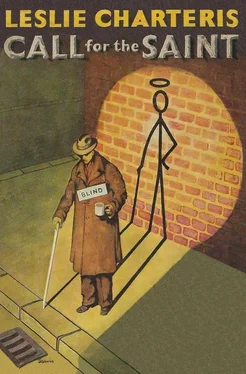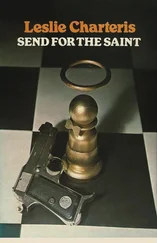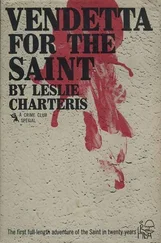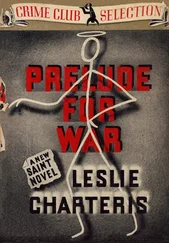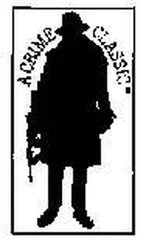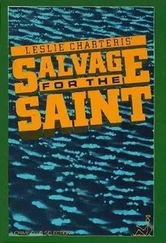Leslie Charteris - Call for the Saint
Здесь есть возможность читать онлайн «Leslie Charteris - Call for the Saint» весь текст электронной книги совершенно бесплатно (целиком полную версию без сокращений). В некоторых случаях можно слушать аудио, скачать через торрент в формате fb2 и присутствует краткое содержание. Город: London, Год выпуска: 1948, ISBN: 1948, Издательство: Hodder and Stoughton, Жанр: Крутой детектив, на английском языке. Описание произведения, (предисловие) а так же отзывы посетителей доступны на портале библиотеки ЛибКат.
- Название:Call for the Saint
- Автор:
- Издательство:Hodder and Stoughton
- Жанр:
- Год:1948
- Город:London
- ISBN:978-9997508164
- Рейтинг книги:4 / 5. Голосов: 1
-
Избранное:Добавить в избранное
- Отзывы:
-
Ваша оценка:
- 80
- 1
- 2
- 3
- 4
- 5
Call for the Saint: краткое содержание, описание и аннотация
Предлагаем к чтению аннотацию, описание, краткое содержание или предисловие (зависит от того, что написал сам автор книги «Call for the Saint»). Если вы не нашли необходимую информацию о книге — напишите в комментариях, мы постараемся отыскать её.
Call for the Saint — читать онлайн бесплатно полную книгу (весь текст) целиком
Ниже представлен текст книги, разбитый по страницам. Система сохранения места последней прочитанной страницы, позволяет с удобством читать онлайн бесплатно книгу «Call for the Saint», без необходимости каждый раз заново искать на чём Вы остановились. Поставьте закладку, и сможете в любой момент перейти на страницу, на которой закончили чтение.
Интервал:
Закладка:
“Den it’s okay, ain’t it?”
The Saint lighted a cigarette and leaned back.
“I wish I could be sure of that.” He blew a procession of three reflective smoke-rings towards the ceiling. “Do you happen to know anything about scopolamine?”
“I never hoid of him. Is he in de same mob with dat Gordian?”
“It’s a drug, Hoppy. It makes people tell the truth. And it seems that somebody gave it to Friend before he was bumped off. They wanted to know how much he’d spilled, and he must have told them. We can also be sure that they asked him all he knew about us... So we can take it the blind-beggar act is dead and has been for some time.”
A scowl of dutiful concentration formed like a sluggish cloud below Mr Uniatz’s hairline as he worked this out and tried to reconcile its components. His mental travail appeared to deepen through successive minutes to a painful degree, and at last he brought forth the root of it.
“Den why,” he asked, “don’t dey give ya de woiks last night?”
“That’s what I’m trying to figure out,” said the Saint slowly. “Unless they’re taking their time to cook up a much bigger and better frame... Big Hazel has a whisky bottle with my fingerprints on it now, and there wasn’t a thing I could do to stop her getting away with it. She really had me off balance — I was so busy turning down a drink that I was sure would be a knockout that the other angle just went by under my nose.”
He blew another smoke-ring very deliberately, devoting everything to the perfection of its rich full roundness, while he tried to make his inward thoughts match the calm of his outward movement.
“Also,” he said, and he was really talking to himself, “it seemed to me that there was just the slightest sinister emphasis — just the merest trace of it — in the way Big Hazel talked about having women in the hotel. I wonder...”
He picked up the telephone and called Monica Varing’s hotel, but her room didn’t answer.
They had parted on a tentative agreement to lunch again, and it was not likely that anyone so punctual as she was would be careless about an engagement. Probably, he told himself, she had gone shopping.
He called again every half-hour until one-thirty, and stayed in his own room for fear of missing her if she called him.
It was not an afternoon to remember with any pleasure or any pride. He must have walked several miles, pacing the room steadily like a caged lion and taking months of normal wear out of the carpet. He tried to tell himself that his imagination was running away with him, that he was giving himself jitters over nothing. He told himself that he should have kept Monica entirely out of it, that he should never have let her learn anything, that he would only have himself to blame if she tried to steal the play from him. He saw her all the time in his mind’s eye, a composite of all her tantalising facets — sultry, impish, arrogant, venturesome, languorous, defiant, tender. He felt angry and foolish and frightened in turn.
Mr Uniatz worked on his BB marksmanship with untroubled single-mindedness. He could learn nothing from the Saint’s face, and to him the operations of the Saint’s mind would always be a mystery. It was enough for him that there was a mind there, and that it worked. All he had to do was carry out its orders when they were issued. It was a panacea for all the problems of life which over the years had never failed to pay off, and which had saved untold wear and tear on the rudimentary convolutions of his brain.
At five o’clock Simon remembered that Monica might have a matinée, and verified it from the newspaper. He walked to the Martin Beck Theatre and went in the stage door.
“Miss Varing ain’t on this afternoon,” said the doorman. “She’s sick.”
With lead settling in his heart, Simon sought out the stage manager.
“That’s right,” said the man, who remembered him. “She called me this morning and said she wouldn’t be able to go on. She said if I hadn’t heard from her by this time she wouldn’t be doing the evening performance either.”
“She isn’t sick,” said the Saint. “She hasn’t been in her hotel all day.”
The stage manager looked only slightly perturbed. He said nothing about artistic temperament, but his discretion itself implied that he could think of plausibly mundane explanations.
Simon took a taxi to the Ambassador and finally corralled an assistant manager whom he could charm into co-operation. A check through various departments established that room service had delivered breakfast to Monica Varing’s apartment at nine, that she had been gone when the maid came in at eleven. But her key had not been left at the desk, and no one had seen her go out.
“No one knows they saw her,” Simon corrected, and asked his last questions of the doorman.
Already he knew what the answer would be, and wondered what forlorn hope kept him trying to prove himself wrong.
“An old ragged woman, looked like she might be a beggar?... Yes, sir, I did see her come out. Matter of fact, I wondered how she got in. Must have been while I was calling someone a cab.”
“On the contrary,” said the Saint, with surprising gentleness, “you opened the door for her yourself.”
He left the man gaping, and went back into the hotel to call Lieutenant Kearney.
Chapter twelve
The boiler-room in the basement of the Elliott Hotel was not quite as bleak as the description implies. This was only because the description does not mention several rows of hard wooden benches, the bodies of several dozen apathetic occupants of them, a few paper decorations left over from some previous Christmas, and the platform at one end where Stephen Elliott was filling in with some merry ad-libs as the Saint found his way in.
“And... ah... as the stove said to the kettle, I hope you’re having a hot time.” Nobody laughed, and Elliott went on, “We want you to enjoy yourselves, friends, and the next item on tonight’s programme is a song by Mrs Laura Wingate.”
He handed Mrs Wingate up to the platform, and the connection between his two statements became somewhat obscure as the piano began to twinkle out an uncertain accompaniment, and Mrs Wingate cut loose with an incredibly piercing and off-key soprano.
“My heart is like a singing bird
Whose nest is in a watershoot,
My heart is like an apple tree
Whose boughs are bent with thick-set fruit—”
Stephen Elliott was taking Mrs Wingate’s place beside a tall, thin, man to whom she had been talking when she was called. As Simon edged up behind them he recognised the tall, thin shape as Lieutenant Alvin Kearney.
“I’m sure I don’t know what it’s about,” the detective was saying, in a voice that had no need to drop its level to avoid interfering with the ear-splitting stridencies that were welling from Mrs Wingate’s throat. “For all I know, it may be just another of his funny gags. But I’d look plenty silly if anything happened and I wasn’t here.”
Elliott took out a handkerchief and patted his temples, while Mrs Wingate continued to liken her heart to various other improbable objects.
“I don’t know anything about it,” he said mildly. “But if he’s working on a case—”
“Oh, is he?” Kearney snapped that up with the avidity of a starving shark. “What case?”
Elliott hesitated.
“I really can’t say,” he replied at last. “Why don’t you ask him?”
“Yes, why not?” Simon agreed, and they both turned.
Kearney’s lip thinned over his teeth as he met the Saint’s affable smile. There was no thoroughly defensible reason for his reaction, yet it was a basic reflex which in its time had produced fundamentally identical effects upon such widely separated personalities as Chief Inspector Teal of Scotland Yard, Inspector Fernack of New York City, Lieutenant Ed Connor of Los Angeles, Sheriff Newt Haskins of Miami, and many others who will be remembered by the unremitting followers of this saga. It was perhaps something that sprang from the primal schism of law and disorder, an aboriginal cleavage between policeman and outlaw whose roots were lost in the dank dawns of sociology.
Читать дальшеИнтервал:
Закладка:
Похожие книги на «Call for the Saint»
Представляем Вашему вниманию похожие книги на «Call for the Saint» списком для выбора. Мы отобрали схожую по названию и смыслу литературу в надежде предоставить читателям больше вариантов отыскать новые, интересные, ещё непрочитанные произведения.
Обсуждение, отзывы о книге «Call for the Saint» и просто собственные мнения читателей. Оставьте ваши комментарии, напишите, что Вы думаете о произведении, его смысле или главных героях. Укажите что конкретно понравилось, а что нет, и почему Вы так считаете.
